 Petzlover
Petzlover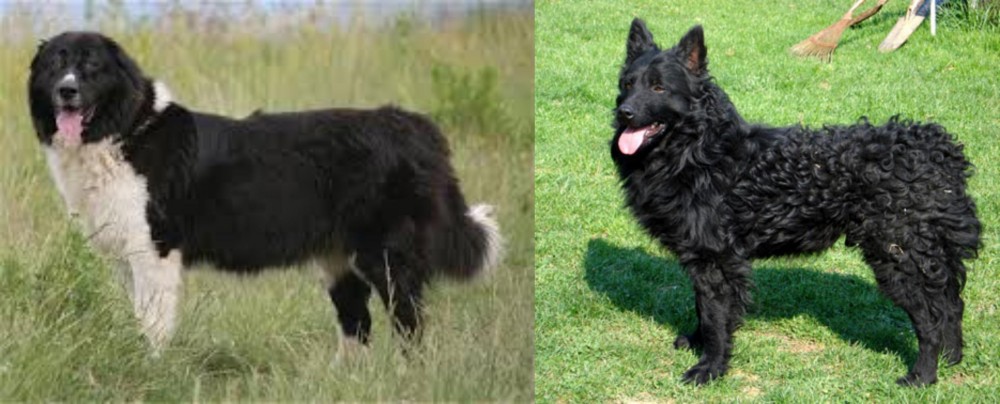 Bulgarian Shepherd is originated from Bulgaria but Croatian Sheepdog is originated from Croatia. Bulgarian Shepherd may grow 22 cm / 9 inches higher than Croatian Sheepdog. Bulgarian Shepherd may weigh 37 kg / 82 pounds more than Croatian Sheepdog. Bulgarian Shepherd may live 42 years more than Croatian Sheepdog. Bulgarian Shepherd may have more litter size than Croatian Sheepdog. Both Bulgarian Shepherd and Croatian Sheepdog requires Moderate Maintenance.
Bulgarian Shepherd is originated from Bulgaria but Croatian Sheepdog is originated from Croatia. Bulgarian Shepherd may grow 22 cm / 9 inches higher than Croatian Sheepdog. Bulgarian Shepherd may weigh 37 kg / 82 pounds more than Croatian Sheepdog. Bulgarian Shepherd may live 42 years more than Croatian Sheepdog. Bulgarian Shepherd may have more litter size than Croatian Sheepdog. Both Bulgarian Shepherd and Croatian Sheepdog requires Moderate Maintenance.
 The Bulgarian Shepard Dog comes from the ancient line of Molossers of Central Asia and Tibet, and the shepherds of the Balkans, Turkey and Caucasus. Among the oldest and most valued of the working dogs of Europe, the Bulgarian Shepherd breed was created by mixing the Balkan breeds with the dogs from Central Asia by the proto-Bulgarians around the 7th century. The Karakachanskoto Kuche was introduced to Bulgaria and accepted by the sheep herders. Mixing this breed in with the Balkan and Central Asian mix developed the Bulgarian Shepherd we know today. In the long run the original Karakachanskoto Kuche became extinct, replaced entirely by the Bulgarian Shepherd even in places where the new breed is still called by the Kuche name. Although the breeds are not the same, most of the dog world does not know the difference.
The Bulgarian Shepard Dog comes from the ancient line of Molossers of Central Asia and Tibet, and the shepherds of the Balkans, Turkey and Caucasus. Among the oldest and most valued of the working dogs of Europe, the Bulgarian Shepherd breed was created by mixing the Balkan breeds with the dogs from Central Asia by the proto-Bulgarians around the 7th century. The Karakachanskoto Kuche was introduced to Bulgaria and accepted by the sheep herders. Mixing this breed in with the Balkan and Central Asian mix developed the Bulgarian Shepherd we know today. In the long run the original Karakachanskoto Kuche became extinct, replaced entirely by the Bulgarian Shepherd even in places where the new breed is still called by the Kuche name. Although the breeds are not the same, most of the dog world does not know the difference.
In Bulgaria however the Karakachan is a national treasure and the history of the breed runs deep. One Kuche could run up to 1200 animals and hundreds were used by the herdsmen in the mountains of Bulgaria. There were many regional types of Bulgarian Shepherds with very little difference between those types. These dogs were so prized by the shepherds that the dogs ate first before the people. The dogs however ate a vegetarian diet of milk, wheat, water and oats. The Bulgarian Shepherd lives a long life of often over 20 years. The Bulgarian Army made good use of these dogs early in the 20th century.
Following World War II, the wolves were close to extinction and property in Bulgaria was nationalized. There was no longer a need for a large force of working dogs. The Communist government exterminated large numbers of sheep dogs including the Bulgarian Shepherd. Only those species on government owned farms and in remote regions survived. When the government farms were disbanded in the early 20th century, these dogs were exterminated as well. Only those in the mountains survived. Commercial breeding of the Bulgarian Shepherd in the end of the century has resulted in controversy as other breeds came into the breeding program.
Use of breeds such as Sarplaninacs, Caucasian Ovcharkas, St. Bernards, Central Asian Ovcharkas and Bosnian Tornjaks in these programs resulted in Bulgarian Shepherd or Karakachans that were a lot different from the original breed. There is therefore some concern about the future of the breed in Bulgaria, yet they received official Bulgarian national recognition in 2000. Today’s Bulgarian Shepherd is a guard dog for both property and livestock.
The official standard for the breed came about in 1991 and in 2005 it was recognized by the Bulgarian State Commission for Animal Breeds. Only those dogs that meet this standard are considered “true” Karakachans. The Bulgarian Shepherds are willing to fight bears and wolves in defense of its family and flock. The dog is brave and loyal, dignified and powerful. They are recognized by both the Dog Registry of America, Inc. (DRA) and the Bulgarian Republican Federation of Cynology (BRFC) a member of the FCI.
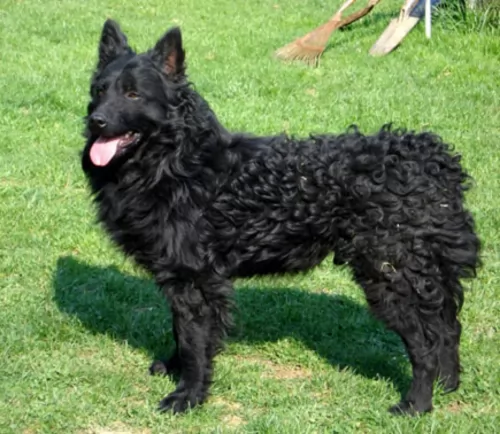 Known also as Hrvatski Ovkars, the black Croatian Sheepdog has been in Croatia since the 7th century already. He was brought to the region by Croats who wanted a strong working dog.
Known also as Hrvatski Ovkars, the black Croatian Sheepdog has been in Croatia since the 7th century already. He was brought to the region by Croats who wanted a strong working dog.
Over the centuries, the dog hasn’t changed much in looks, and in 1935 a breeding program for the dog was developed. A certain Dr. Romic started the program with 3 dogs, and the work he did with the dogs saw that the Croatian Sheepdog got official recognition a few decades later.
In March 1968, the Yugoslav Kennel Club adopted the breed standard, and since then, several kennels recognize the Croatian Sheepdog. The dog is still not known particularly well outside their own county, but in Croatia it is essentially known as a companion dog.
 A massive, powerful and muscular Molosser, the Bulgarian Shepherd is strong, agile, powerful and fast. They are intelligent and reliable. They have a long, thick, harsh coat in white with patches of black. Their skull is massive and broad with a furrowed forehead. The muzzle is massive as well while the nose has wide nostrils and is fairly large. It has close fitting, thick lips with strong, scissor bite jaws. The Bulgarian Shepherd’s eyes are deep, oblique and small. They are either hazel or dark. They have an intelligent and confident, yet firm almost grim expression.
A massive, powerful and muscular Molosser, the Bulgarian Shepherd is strong, agile, powerful and fast. They are intelligent and reliable. They have a long, thick, harsh coat in white with patches of black. Their skull is massive and broad with a furrowed forehead. The muzzle is massive as well while the nose has wide nostrils and is fairly large. It has close fitting, thick lips with strong, scissor bite jaws. The Bulgarian Shepherd’s eyes are deep, oblique and small. They are either hazel or dark. They have an intelligent and confident, yet firm almost grim expression.
Their ears are low set, small and v-shaped. They sit close to the head which sits on a powerful but short neck. They have a broad back, well-muscled body with a deep chest and long, rough tail. Their gait is a trot with a spring in their step. There are two types of coats – longhaired and shorthaired with no undercoats.
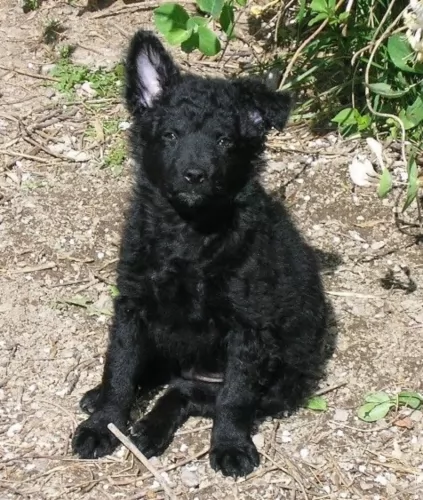 The Croatian Sheepdog is a medium sized, muscular dog which stands roughly 40 – 53cm at the withers and weighs 13 to 20kg. The head is wedge shaped and lean and he has brown to black colored eyes.
The Croatian Sheepdog is a medium sized, muscular dog which stands roughly 40 – 53cm at the withers and weighs 13 to 20kg. The head is wedge shaped and lean and he has brown to black colored eyes.
The triangular-shaped ears are medium sized and semi-erect or erect. The tail of the dog is often docked, but if not it is set high and is inclined to curl over the back.
The dog is nearly always black although you’ll find a few white hairs on the throat or chest or on the legs and toes. The double coat is of medium length, being wavy or even slightly curly.
The Croatian Sheepdog is an athletic, alert dog and he has high energy levels, loving to be put to work or to be busy with one or other activity. He fits in well as a family pet and gets on well with children and pets in the home, but he is going to need plenty of exercise and games.
This particular dog won’t do well with a family of couch potatoes as he craves lots of activities. He will certainly benefit from training and socialization, and because he is intelligent he learns easily and then he is obedient and ready to please.
He is a dominant, confident dog who thrives on attention from his human family. He isn’t a dog you can just stick in the backyard as he is social and craves activity and attention. He is wary of strangers and makes an excellent watchdog.
 This is a working dog, intelligent and independent guard dog. Reserved around strangers but loyal and devoted with his family. Tolerant of children in their family if they were raised with them. Not only will she defend human family members, she will guard and defend household pets as well. He is quite capable of making her own independent decisions. These are very intense guard dogs that will respond aggressively if they think their people are being attacked.
This is a working dog, intelligent and independent guard dog. Reserved around strangers but loyal and devoted with his family. Tolerant of children in their family if they were raised with them. Not only will she defend human family members, she will guard and defend household pets as well. He is quite capable of making her own independent decisions. These are very intense guard dogs that will respond aggressively if they think their people are being attacked.
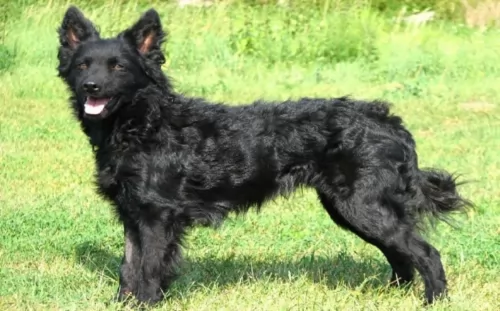 The Croatian Sheepdog isn’t a demanding dog, although he will be relying on you to give him plenty of exercise. He wants to please and will fit into life in the city or life in the country, so long as he gets regular exercise.
The Croatian Sheepdog isn’t a demanding dog, although he will be relying on you to give him plenty of exercise. He wants to please and will fit into life in the city or life in the country, so long as he gets regular exercise.
It doesn’t take much to keep the Croatian Sheepdog happy and content, and when he thrusts his wet nose into your hand and you see his wagging tail, you’ll know its all been worth it to give this pet the best as he gives you his undivided love and loyalty.
 The breed itself is known to be healthy but they do face some of the usual health issues of the massive, giant breeds. This includes knee and elbow dislocation; hip dysplasia; bloat; entropion and osteosarcoma. All of these conditions require medical intervention, but bloat and osteosarcoma are the deadliest. Bloat needs immediate attention and osteosarcoma is a deadly bone cancer.
The breed itself is known to be healthy but they do face some of the usual health issues of the massive, giant breeds. This includes knee and elbow dislocation; hip dysplasia; bloat; entropion and osteosarcoma. All of these conditions require medical intervention, but bloat and osteosarcoma are the deadliest. Bloat needs immediate attention and osteosarcoma is a deadly bone cancer.
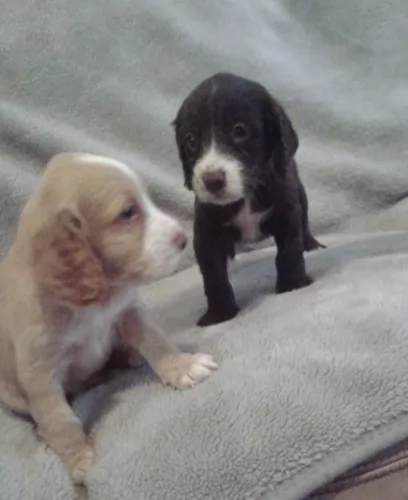 The Croatian Sheepdog is a healthy dog breed. He is the kind of pet that won’t cost you a lot of money because he is low maintenance. In fact he is a dog which has developed resistance to many diseases.
The Croatian Sheepdog is a healthy dog breed. He is the kind of pet that won’t cost you a lot of money because he is low maintenance. In fact he is a dog which has developed resistance to many diseases.
With good food, exercise and love and care he won’t cost you much in terms of vet’s fees. He can live to be 12 to 15 years of age.
Even though he is a healthy kind of dog, there are some dog illnesses that you will want to be aware of such as bloat and eye problems. Also if you aren’t going to let him become a parent, then spaying or neutering your Croatian Shepherd will have numerous health benefits for him.
 These are large dogs with large appetites, but you want to keep them lean and active. Feed them at least twice a day with a high quality large or giant dog dry food. Four to five cups of food per day is the maximum.
These are large dogs with large appetites, but you want to keep them lean and active. Feed them at least twice a day with a high quality large or giant dog dry food. Four to five cups of food per day is the maximum.
Patellar Luxation – a floating kneecap or dislocated knee. Will cause lameness.
Osteosarcoma – bone cancer must be treated immediately as it is potentially fatal.
The Bulgarian Shepherd needs a good amount of exercise every day. Remember this is a working breed and they need a job. Long walks every day are essential for his well-being.
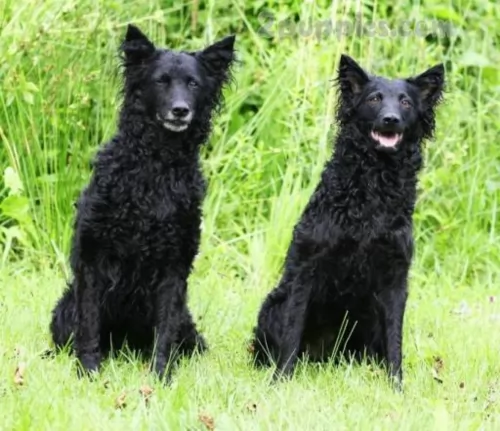 The Croatian Sheepdog has always been a working dog and is regarded as a hardy, low maintenance dog. He will require minimal grooming so a good brush twice a week will suffice.
The Croatian Sheepdog has always been a working dog and is regarded as a hardy, low maintenance dog. He will require minimal grooming so a good brush twice a week will suffice.
There are excellent and convenient dog foods on the market which have been specifically manufactured to ensure your dog gets all the vitamins and minerals he needs for health and energy. Stick to the feeding instructions on the label so that he maintains his lean, muscular body.
Raw meat can be expensive, but it will be to his benefit if you can include some raw meat into his kibble every now and then. If you are unsure in any way as to how to feed your dog, your vet can give you good advice on a food that caters for his age and his activity levels. Always make sure that he has a fresh bowl of water available.